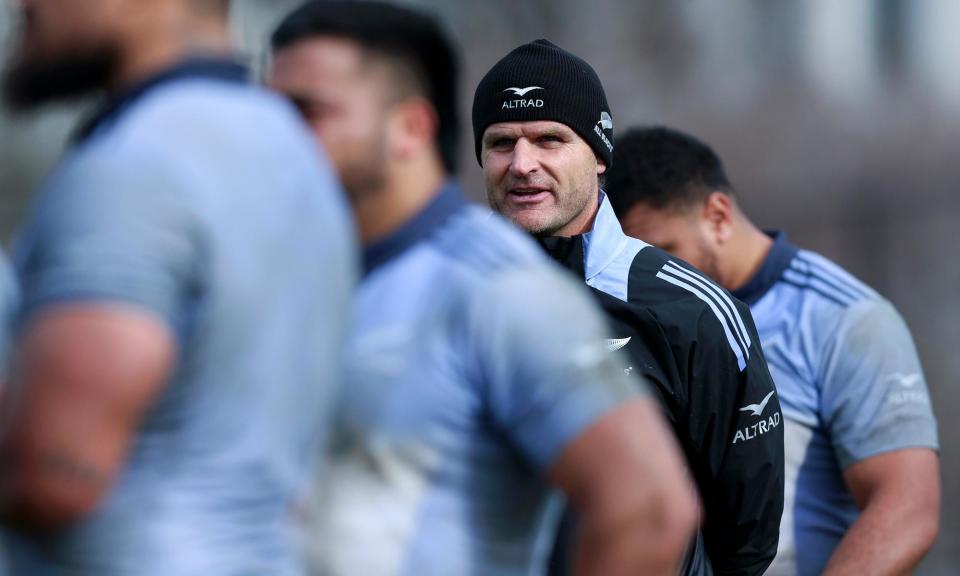‘Razor’ Robertson is All Blacks’ surf dude tasked with sinking England

Scott “Razor” Robertson could hardly be further removed from the traditional image of an All Blacks head coach. You never heard about Sir Graham Henry checking the latest surf conditions or Sir Steve Hansen indulging in post-game breakdancing. Or Ian Foster, the most recent incumbent, opening up about having dyslexia and describing a close shave with a massive tiger shark.
Which, from the perspective of the Kiwi rugby public, is slightly unsettling. The sport needs characters and colour and Robertson has been delivering in both respects before his team even take the field, with a documentary on his rise from surf dude to New Zealand’s ultimate oval office already released on YouTube. On the other hand, no amount of breakdancing skill will help if the national team suddenly lose their obsessive winning edge.
Which might explain why one of Robertson’s first acts has been to invite the legendary Richie McCaw into the camp to educate his players about the huge difference between playing Super Rugby and representing the All Blacks. If England contrive to gatecrash Razor’s welcome party in Saturday’s first Test, the new coach’s honeymoon period will be the briefest on record.
Related: Marcus Smith ready to become master of his own destiny at No 10 for England
Even Robertson concedes “the enormity” of it all is probably set to hit him beneath the roof of Dunedin’s Forsyth Barr Stadium. To suggest he is totally unprepared, though, is inaccurate. Having played for the All Blacks himself – he won 23 caps between 1998 and 2002 – and coached the Crusaders to seven successive Super Rugby titles, he knows precisely what ingredients are required to create a winning rugby team.
In his eyes it primarily boils down to caring for players and building connections. “My job is to connect them and make them believe. What does it look like? How does it feel? How are people going to own it?”
He has been less publicly forthcoming about precisely how his New Zealand will play, while his dyslexia means he communicates with his players in a more visual way. “What is the mindset overall? Who is going where? Bringing it alive is the key,” he says. “That’s what I like the guys to have in their minds. I am not great at admin. I just talk to pictures.”
The talkative, empathetic 49-year-old has certainly come a long way from his childhood days in Mount Maunganui, where his life revolved around the beach, the surf life-saving club and fishing. The son of a fireman, he has never been a collar-and-tie man and still cites a spell playing club rugby in Newtownards just east of Belfast as a formative time. “It helped me mature massively. I was a bit sheltered and limited in my thoughts. The number one thing I learned was that I had to get an education,” he says.
“A lot of the guys there went to Queen’s University. I would sit in the back of the lecture theatre and listen. They were going off to Amsterdam or London to work in finance and the markets. Education gave them those opportunities and I hadn’t had that. I wasn’t going to be a brickie or a labourer.”
So he enrolled as an adult student and his life changed. “I sat in front of the best-looking girl in class and married her seven years later,” he says. “Jane got a double degree – she got hers and mine. I learned about myself at uni. ‘How do I work? Who do I need around me? What are my blind spots? What am I missing?’” It led to him signing a groundbreaking contract with the Crusaders, who paid for him to do his degree course at Lincoln University. “I was a bit of a pioneer in that regard.”
It remains the case, even so, that Test rugby is a different beast to Super Rugby. Robertson has coached New Zealand Under-20s but has never had to cope with the full weight of national scrutiny. His assistant coach, Leon MacDonald, however, reckons his old teammate has served a sufficiently long apprenticeship. “You’ve got to be really, really, really ready to be coach of the All Blacks,” MacDonald says. “It’s definitely not one to rush into but Razor’s done his time. He’s ready and he’s got runs on the board.”
When you ask MacDonald to describe Robertson to people who have never met him, the word “energy” is front and centre. “He’s always trying to think of ways to keep pushing the team forward,” he says. “He’s got a very wide understanding of the game in all departments. There are not many head coaches who are as deep into the game as he is.”
There are equally few head coaches who can describe how it feels to encounter a tiger shark while surfing off the coast of South Africa. “It was massive. I looked around and no one else was there so I just went straight up on my board and straight in with my feet up. It was close enough. That was my little moment.”
Undeterred, he still studies the daily surf reports religiously – “I’m a water man” – but sinking England is his priority. Before Steve Borthwick’s appointment there was a moment when Robertson was linked with the England role – “Me and the missus were talking about living in a castle at one stage!” – but he looks very happy to be back in black.
“I didn’t really want to go back into club rugby … it was time to test myself at Test level,” he says. “I did have other opportunities, but my first choice was where I am now.” While he says there will be no more breakdancing until the 2027 World Cup has been won, the All Blacks’ new mix master is finally in the house.

 Yahoo Sport
Yahoo Sport 






































